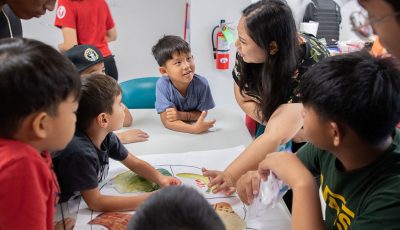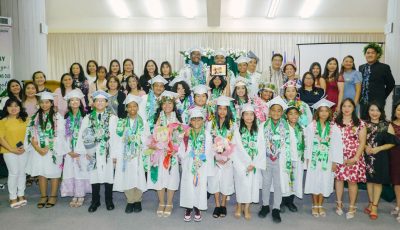Educators challenged to be ‘active knowledge mediators’

Education Commissioner Dr. Rita A. Sablan, Northern Marianas College interim president David Attao, Board of Education chair Herman T. Guerrero, NMC Board of Regents chair Frank Rabauliman, and regents Elaine Orilla and Cyndi Deleon Guerrero (not in photo) present a plaque to Palau Community College president Dr. Patrick Telei for his “Neil Baumgart Lecture” at the opening of the Pacific Circle Consortium on Tuesday. At the same time both PSS and NMC education leaders honored PCC for reaching 40 years with executive committee member Shiowlan Doong receiving the award on behalf of the consortium. (Contributed Photo)
In its second day, the 40th Pacific Circle Consortium welcomed University of Guam president Robert A. Underwood at Saipan Southern High School yesterday. In his keynote address, he urged educators to be “active knowledge mediators.”
“When you help generate knowledge, when people find that they can have real meaning in their lives and in the lives of others then they are fully involved in the process of knowledge making or knowledge mediating,” he explained.
The week-long consortium, which is hosted by the CNMI Public School System, Northern Marianas College, and RTI International, aims to promote understanding and camaraderie among countries in the Pacific region.
Underwood told those in attendance of the imperativeness of taking ownership of their teaching as well.
“It is so vital to begin the process of learning by learning about yourself. When you do that, you have great ownership,” he said.
He explained that the primary job of an educator is to empower people to create and develop more knowledge for themselves and others.
“If you are just an observer of knowledge production or being allowed to participate in someone else’s knowledge production, you’ll look like an outsider and you’ll feel like you’re alone. You don’t become fully educated,” he added.
He reminded the room full of educators of their capacity to assist students in navigating their way through their educational endeavors.
“[We do this] not just for the sake of maintaining indigenous languages and cultures, but because you are shaping people. You are making them more empowered. You’re making them more reflective. You’re making them better and more effective learners.”
Underwood also touched on the subject of cultural heritage in 21st century education. He noted that competition is not the answer when considering the quality of education each district provides. Rather, he explained, “the argument is that knowledge is for all humans to have. No one has exclusive knowledge or exclusive ownership over knowledge.”
He added, “The power over knowledge, the ownership, the ability to create and recreate knowledge is all in your hands as practicing educators, people who can make a difference in the lives of generations.”
Audience members greeted Underwood as he concluded his address before heading into several sessions covering an array of educational topics.
NMC interim president David Attao and Board of Regents chair Frank Rabauliman said in a joint statement that they “have no doubt that the presentations, discussions, and networking that will take place over the next few days will contribute to the advancement of educational research and development in our region.”
One educator in attendance, Elvira Mesngon, a school counselor from Rota, said, “We all need to learn from each other. What works in one island can work in the other.”
She told Saipan Tribune that one of the most impactful discussions she took part in was about including Pacific literature in the classroom.
“Why not have something that our kids are familiar with and can relate to in the classroom? It only makes sense that we educate them and that we do also have scholars in literature. I really enjoyed listening to all the points because there is a need,” she added.
For her part, Kagman High School principal Leila Staffler said, “I really enjoyed all the different topics. They are really close to home…the work that they are doing for education is pretty exciting.”
The event’s theme is “Navigating global trends of education within the Pacific region.” The PCC consists of members from Australia, New Zealand, several Pacific Islands, China, Hong Kong SAR, Japan, South Korea, Malaysia, Taiwan, Thailand, Sri Lanka, United States of America, Vietnam, Canada, Latvia, and Mexico.



























